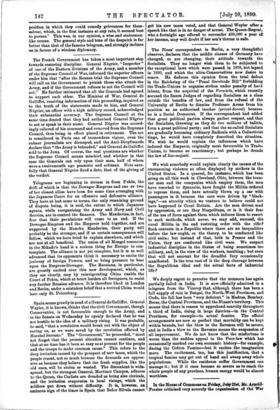Spain seems greatly in need of a General de Galliffet.
General Weyler, it is known, thinks that the civil Government, though Conservative, is not favourable enough to the Army, and
• in the Senate on Wednesday he openly declared that he was not hostile to the idea of a military rising. It was probable, be said, "that a revolution would break out with the object of saving us, as we were saved by the revolution effected by Marshal Serrano." The " Government," he proceeded, " must not forget that the present situation cannot continue, and that at no time has it been so easy as at present for the people and the troops to make common cause." This refers to the deep irritation caused by the prospect of nen, taxes, which the people resent, not so much because the demands are oppres- sive as because they believe that the fresh supplies, like the old ones, will be stolen or wasted. The discontent is wide• spread, but the strongest General, Martinez Campos, adheres to the Queen, the Carlists are dreaded as being also clerical; and the irritation evaporates in local risings, which the soldiers put down without difficulty. It is, however, an ominous sign of the times in Spain that Senor Silvela cannot
get his new taxes voted, and that General Weyler after a speech like that is in no danger of arrest. The Queen-Regent, who a fortnight ago offered to surrender £80,000 a year of her income, may well doubt if her son's throne is safe.


































 Previous page
Previous page